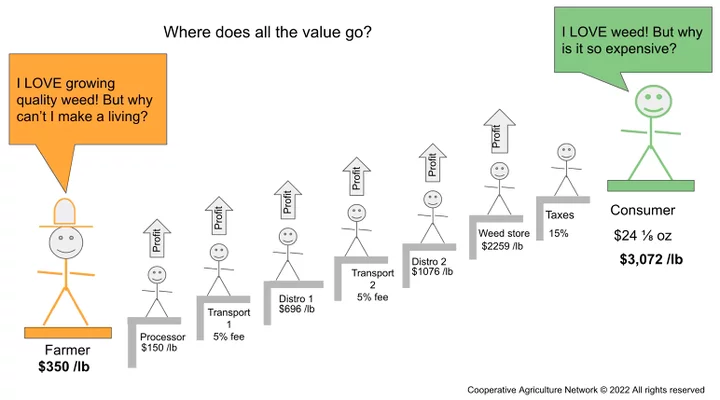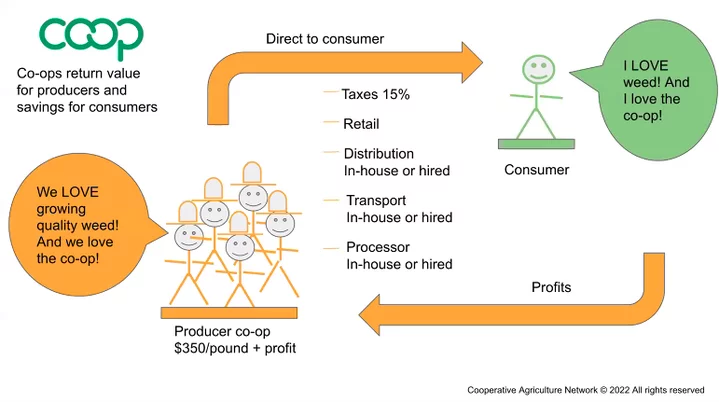Small-scale cannabis producers look to cooperatives as a saving grace. | Image: Cooperative Agriculture Network (CAN)
###
Are cooperatives the future of Humboldt’s cannabis industry?
As corporate cultivation operations expand across California, small-scale cannabis farmers are joining forces to push back against their large-scale competitors.
The Cooperative Agriculture Network (CAN), a project of Cooperation Humboldt, launched an eight-week virtual academy this week to teach local cannabis producers everything they need to know about starting their own legal cannabis co-ops. Local farmers and industry experts believe the development of a cooperative sector within the cannabis industry will lead to long-term economic viability for our region’s cannabis farming community.
“We were seeing that legalization was not going to support small family farms – it was actually destroying them,” Nicole Riggs, an affiliate researcher with the Center for the Study of Cannabis and Social Policy (CASP), said during this week’s introductory course. “We didn’t want to see Humboldt succumb to the desolation that’s happening to the rest of rural America. We looked to cooperatives because we know that that’s a tried and true pathway for small independent businesses to work together and establish a place in the industry against corporate consolidation.”
CASP surveyed farmers throughout the Emerald Triangle in 2021 to determine whether there was any interest in forming local and regional cannabis cooperatives. The survey, “Corporate Cannabis is Coming: Cultivators, Are You Ready?” asked around 80 cannabis producers what services are lacking locally. Over 85 percent of survey respondents said they wanted more local support for cooperative development.
“They told us that they wanted to see cooperatives that would reflect the legacy experience, meaning homesteading and environmental stewardship, sharing genetics, working together to get sales and marketing,” Riggs said. “We have solid data that people want to have tools for cooperation, that they believe it will be useful. We developed [this] academy to provide farmers with these tools.”
What would a legal cannabis co-op look like, you ask? There are actually two legal cannabis co-ops already operating in Humboldt County: Uplift Cooperative and Salmon Creek Legacy Farms. Rather than operating as independent farmers, co-op members can rely on one another and share the burden of the entire production process.
“Through cooperatives, we can get to essentially pull in more and more of these verticals that are taking away our capacity for our capital,” Shawn Cherry, co-founder of Salmon Creek Legacy Farms Co-op, said. “There are all these different steps in the supply chain [and] I’m pretty convinced that they’re extraneous, if not redundant. … For example, we have the ability to get our product [to distributors] without having to hire [someone] to transport. If one of us has [the permit], we can outsource it to the rest of the co-op.”
Because each member of the co-op has an equitable vote in the company, “it cannot be controlled by capital,” Drew Barber, owner-operator of East Mill Creek Farms and co-founder of Uplift Co-op, explained. “The person who has the biggest investment of money doesn’t get the biggest say about how it works, which obviously has its challenges, and we work through that as well,” he said.
Cannabis producers under the existing legal framework. | Screenshot
###
Cannabis producers operating as a cooperative. | Screenshot
###
Co-ops can operate in a variety of ways, ranging from informal to formal, but tend to follow the seven cooperative principles:
- Voluntary and open membership
- Democratic member control
- Member economic participation
- Autonomy and independence
- Education, training and information
- Cooperation among cooperatives
- Concern for community
“There are also all kinds of non-financial methods of cooperation,” Tobin McKee, cooperative developer at Cooperation Humboldt, said. “Just sharing the burdens of everyday life, watching each other’s kids and so on. … It doesn’t need to be a formal entity. … We make an agreement, decide this is how we’re going to do it together and then we keep those agreements. And then, if those agreements aren’t working, we say, ‘Hey, this agreement isn’t working for me, can we change it?’ and then as a group, we collectively work to change the agreement.”
Courtney Bailey, co-founder of Giving Tree Farms and a founding member of Hive Mendocino Cooperative, emphasized the importance of finding people with similar values and a compatible work ethic.
“There was a lot of heavy lifting in the beginning, and if someone’s not answering emails, not showing up … it can really slow you down,” she said. “We had to let a member go early on … but now, we’re starting to see that [the co-op] holds itself together naturally. It’s nice to see that it’s now its own entity keeping us together.”
Interested in co-oping with your neighbors? You may have missed the introductory course but there are still seven weeks left in the free CAN Academy. You can sign up here.



CLICK TO MANAGE